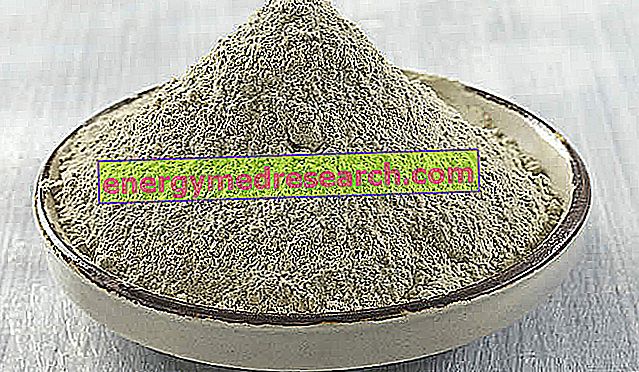Generality
Bentonite is a product of mineral origin consisting mostly of aluminum silicates, and in the slightest trace also of minerals such as iron, calcium and magnesium.
Widespread mostly in the United States and Canada, Bentonite is able to absorb a lot of water, forming a viscous gel.
Precisely because of these rheological characteristics, Bentonite is used in the food sector as an additive (E558), in the pharmaceutical field and sometimes as a nutritional supplement.

Indications
Why is Bentonite used? What is it for?
Bentonite is a natural compound - more precisely a clay mineral mostly composed of montomorillonite (hydrated aluminum silicate) - used in various fields.
Bentonite and health
The applications of Bentonite in the clinical setting are very scarce and not yet completely clear.
However, first evidence would seem to attribute to the proper use of Bentonite an effective chelating action against some toxins and heavy metals.
Bentonite and food industry
Bentonite is classically used in the food industry as an additive, indicated on the label with the initials E 558.
In addition to being an anti-caking and emulsifying agent, Bentonite can also be used as a clarifying agent in the production of fruit juices.
Bentonite and the pharmaceutical industry
Bentonite is classically used in the pharmaceutical and cosmetic field as a stabilizer for oil / water suspensions and emulsions, rather than as an excipient for ointments and ointments.
Property and Effectiveness
What benefits has Bentonite shown during the studies?
With reference to the benefits deriving from the integration with Bentonite, clinical studies conducted on men are still absent.
However, in some experimental works, mostly carried out on rats, Bentonite would have been useful in reducing the toxic effects of some toxins, such as aflatoxins, and some heavy metals.
Doses and method of use
How to use Bentonite
Bentonite, present on the label as E558, is sometimes used as a supplement in dosages ranging from 5 to 10 mg.
Its use as a supplement is very rare and prohibited in many countries (see below), while its use as an anti-caking and emulsifying agent is much more frequent, both in the food and cosmetic sectors.
Side effects
The use of Bentonite, at higher doses than those present as a food additive, could determine the appearance of gastro-intestinal side effects such as cramps and diarrhea.
In some cases, characterized by low fluid intake, the use of Bentonite has been associated with intestinal obstruction.
Contraindications
When should Bentonite not be used?
Bentonite is contraindicated in case of hypersensitivity to the compound and in case of anatomical and functional alterations of the gastro-intestinal tract.
The aforementioned contraindications to the use of Bentonite obviously extend also to pregnancy and the subsequent period of breastfeeding.
Following checks carried out by EFSA (the European Food Safety Authority) on possible risks to human health deriving from the presence of aluminum in food, the Ministry of Health has recently modified the conditions of use of food additives containing aluminum.
In light of the restrictions adopted for the use of clays as additives, starting from the productions of February 1, 2014 the use as ingredients in food supplements of the following substances is prohibited :
- sodium silicate and aluminum (E554)
- potassium and aluminum silicate (E555)
- calcium silicate and aluminum (E556)
- bentonite (E558)
- aluminum silicate or kaolin (E559)
For the other clays used as ingredients in food supplements, the type and content with the indicated intake quantities must be specified on the label. Furthermore, with the notification of the label a certification must be provided on the extent of the presence of aluminum.
Pharmacological Interactions
Which drugs or foods can modify the effect of Bentonite?
The simultaneous administration of Bentonite and drugs, rather than other supplements, could reduce the bioavailability of the co-administered active ingredients, varying their clinical effectiveness.



